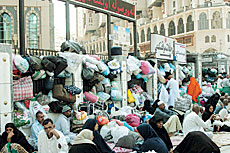MINA, 14 January 2006 — The new Umrah regulations that issue pilgrimage visas year-round is one of the key causes in the increase in overstayers and illegal squatters during Haj, according to Dr. Rashad Mohammed Hussein, vice chairman of the board of South Asian Pilgrim Establishment.
“Those overstaying pilgrims, in addition to existing illegal residents, form more than 76 percent of squatters in the holy sites,” Hussein said yesterday in an interview with Arab News.
Squatters that have caused bottlenecks around the entrances to the Jamrat Bridge have been blamed for Thursday’s fatal stampede that killed at least 363 pilgrims.
Hussein pointed out that the relaxation of Umrah visa regulations has encouraged an increase in illegal pilgrims. Many pilgrims come for Umrah (the lesser pilgrimage) and decide to remain in the country to wait for the pilgrimage that fulfills one of the pillars of Islam, the Haj.
Squatters, who are not performing their Haj through the tour operators (Tawafas), are often seen carrying all of their belongings with them during the rituals. Some simply decide to set up their illegal camps at locations near the holy sites, such as the walkways and entrances to the Jamrat Bridge.
Still others, who are legal, simply decide not to return to their legal campsites for the three-day stoning ritual.
“When they reach the Jamrat after walking for more than four or five kilometers many of the pilgrims are exhausted, and they decide to stay near the Jamrat instead of going back to their faraway camps,” he said.
The illegal squatters, the ones who simply forgo the requirement to register with Tawafa organizations, are both Saudi and foreign. These illegal pilgrims become squatters for two reasons, Hussein said: One is economical — they cannot afford to pay for a Tawafa establishment — and the other is spiritual — they simply don’t believe in the need to get a license to perform Haj. The latter is especially true of Saudi pilgrims, some of whom take umbrage at the law that restricts the number of times the Haj can be performed to once every five years.
The majority of the squatters, however, are foreign. And these numbers have swelled due to the year-round issuance of Umrah visas, said Hussein. The Haj Ministry estimates that one million Umrah pilgrims arrive every month, and some decide to stay illegally, waiting for the next Haj.
“If we find a solution to minimize the problem caused by overstaying Umrah pilgrims, we would be solving the biggest problem that causes the stampedes,” said Hussein.


